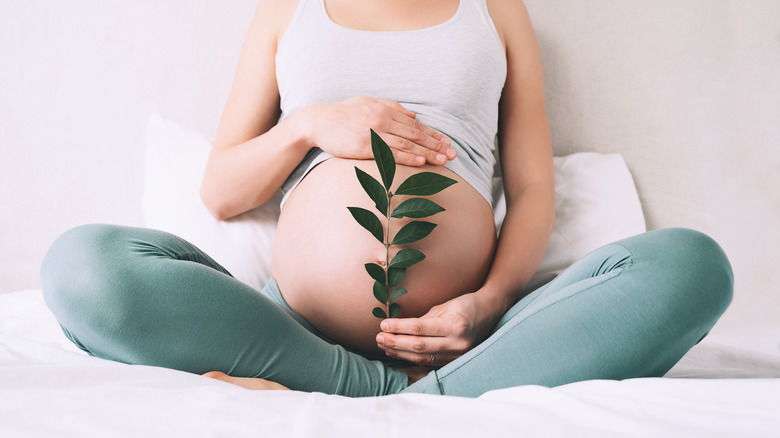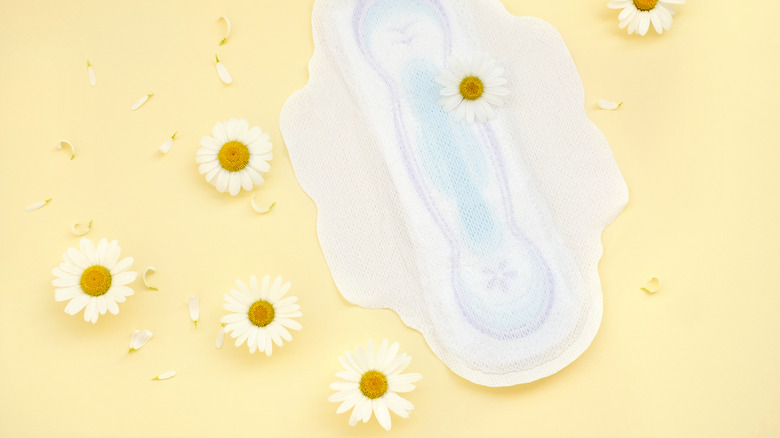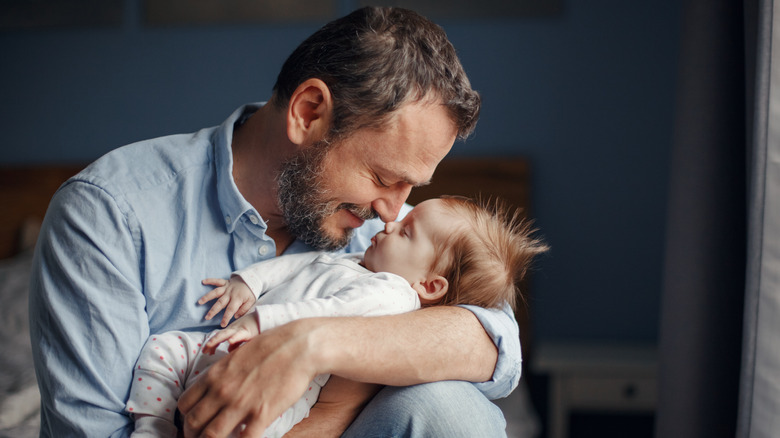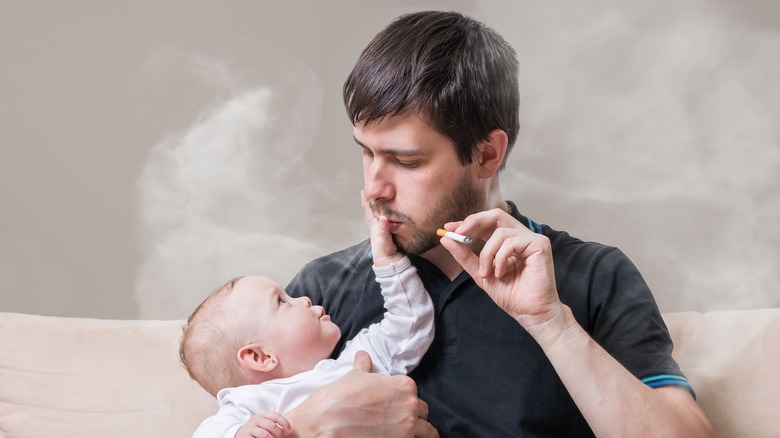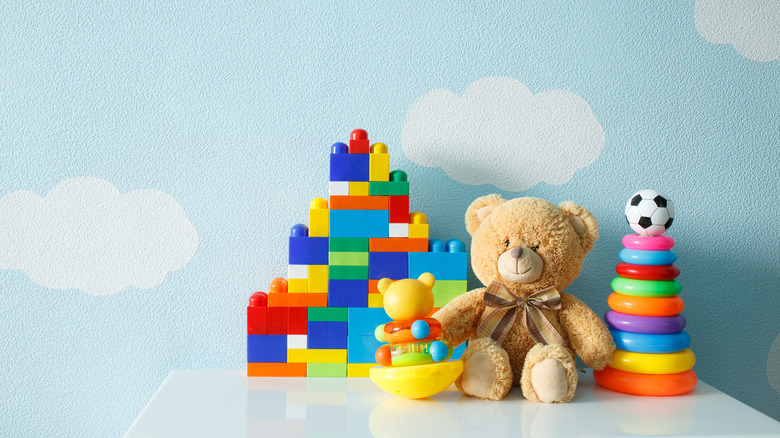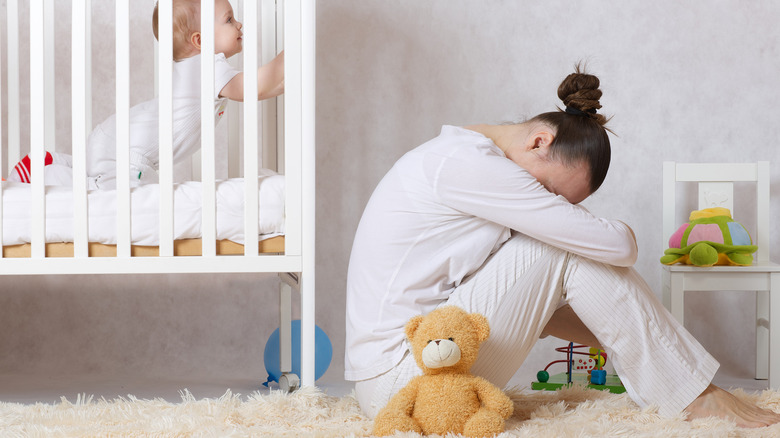Things You Shouldn't Do After Giving Birth
Giving birth is a chaotic and magical experience, though sometimes the scales can tip more toward chaos. New moms are bombarded with information and opinions about how they should best care for their babies, what and how to feed them, whether or not to sleep train ... and in this day and age, the added pressures of social media create unrealistic expectations about what giving birth and having a newborn should look like. With all of the external pressures, the hormone fluctuations, and the sheer amount of unsolicited advice, it is no wonder that so many new moms end up confused and anxious (via Health Partners).
The internet is overflowing with opinions about what you should do as you adjust to your life and body after your baby is born. But it's also important to break away from all of the shoulds and take a moment to consider the should nots for your own health and the health of your baby. We'll get this one out of the way up front: After nine months of not eating deli meat or goat cheese, not sleeping on your stomach, and not enjoying a glass of red wine, get after it, mama. Those are things that are absolutely not included in the list of things to avoid after giving birth (via Healthline). Cheers!
You shouldn't ignore pain
Physical pain is your body's way of signaling to you that something is not right, and when it comes to the days and weeks after giving birth, it is crucial to listen to the physical sensations that your body is communicating (via Healthline). The kinds of pain that you might experience after birth vary based on how your birth went. The pain can also vary in severity and duration based on whether or not it was your first child, or if you gave birth vaginally or via C-section. General pain in the afflicted area — the uterus, vagina, perineum, etc. — is par for the course after the trauma your body experienced.
However, there are others types of pain that should not be ignored. Heavy bleeding, severe headaches, fevers, foul-smelling discharge, pain and swelling in the legs, and difficulty breathing are all major causes for concern. If you feel that your pain exceeds what is normal, it is best to contact your doctor so they can ensure the pain isn't a sign of something more serious. They can also prescribe medication or explain other techniques that may help expedite your healing. If any pain you are experiencing feels like too much, don't ignore it.
You shouldn't worry about appearances
While this shouldn't is more nebulous than some others, it is important to remember that keeping up with appearances immediately after giving birth is totally unnecessary (via Today's Parent). It is fine if you do not want your in-laws staying with you for the first three weeks of your newborn's life. It is okay if you do not have it in you to make your traditional Thanksgiving dinner, and you do not need to participate in the monthly photoshoots that social media seemingly demands new moms put their babies through.
Not only did your body just go through some serious physical changes, but you have to adjust to life with an entirely new, incredibly dependent family member. The first few days of new motherhood are incredibly precious when it comes to things like enjoying skin-to-skin contact with your baby and getting the hang of breastfeeding, if that's the feeding method you want to pursue. Your responsibility is to care for yourself and for your baby, the rest is just noise.
Experts encourage new moms to set boundaries and hold firm. They encourage women who recently gave birth to ask for help when they need it and avoid falling into the trap of expectations — your experience is your own, and spreading yourself too thin can set you up for disappointment down the road.
You shouldn't forget to lean on your support system
Surrounding yourself with a supportive community is a great way to help you heal and adjust to life as a new mom (per Healthline). Social support after the baby is born can help act as a buffer to soften symptoms of postpartum depression, as well as offer a great outlet for helping to adapt to your new normal.
The "baby blues" often come on after childbirth, and though they often resolve on their own after a few weeks, it is important to utilize your support system to help with this season of life. Even if you manage to avoid the baby blues and postpartum depression, surrounding yourself by supportive people who love you can have huge benefits. A study published in the Maternal Child Health Journal found that the more support women have after giving birth, the more equipped they will feel to cope with the mood swings and dramatic life changes that are part and parcel of being a new mom. If you are experiencing struggles after giving birth, reach out to your support system and ask for help. Hiding your struggles is likely to make things harder. After all, they do say that it takes a village. And if your symptoms persist for more than two weeks, it's important to reach out to your doctor for an evaluation.
You shouldn't put anything into the vagina
Luckily, refraining from putting anything into your vagina after giving birth is something that you can easily avoid doing (via Healthline). After giving birth, some women experience radical changes in their vaginas; others feel like themselves after a few short weeks. The healing journey is different for everyone, but doctors all agree that postpartum women should absolutely avoid putting anything inside of their vaginas for at least six weeks after giving birth.
The main reason to avoid this is to prevent an infection from occurring. Introducing foreign objects into this vulnerable area increases the risk of inviting harmful pathogens to proliferate. As far as sex after childbirth, the guidelines are a bit murkier, though doctors seem to agree that the risk of infection from sex decreases about two weeks after giving birth, and that some women might be clear for sex in about four weeks. Remember, the healing process is different for everyone, so there is no hard guideline that you are required to follow.
If you had stitches, it is important to allow ample time for the wound to heal. Even though you might be bleeding, doctors warn patients not to use menstrual cups or tampons during this time. Pads and sweatpants are the way to go.
You shouldn't neglect your own healing
We get it. Having a new baby is all-consuming. From the lack of sleep due to nighttime feedings, to the constant attention and diaper changes, to staring at this perfect little being that you've created, it seems like every second of the day is accounted for. But according to an article published in Today's Parent, neglecting your own self-care can lengthen your recovery time and sabotage many of your recovery efforts. Setting aside at least 30 minutes for yourself every day to do regular things such as shower, bathe, and use the restroom by yourself can help you keep your sanity as you adjust to life's big changes.
If your body is having trouble healing from the trauma, one things you can do is relax in an Epsom salt bath. Not only will this give you a bit of space to replenish your mental and emotional fortitude, but it will also help encourage healing to your affected areas. It's also important not to underestimate the power of getting outside for a quick walk and some fresh air. However you choose to care for yourself, just make sure that you are doing it.
You shouldn't exert yourself or rush to get your body back to normal
One of the better things you can do after giving birth is to take time and not rush to resume your pre-baby life — especially if that entails extreme or long workouts. No matter what your birth story ends up being, the first six weeks after giving birth are critical for healing (via What to Expect). While there are ways to expedite the healing process, it is important to rid yourself of any societal pressures you may be feeling to "get your body back" or heal based on someone else's timeline.
A crucial component of healing after giving birth is to avoid exerting yourself physically (via Healthline). Yes, the demands of caring for a newborn rival the efforts of running the Chicago Marathon, but overdoing it can cause problems in the long run. For instance, pushing yourself too hard physically can cause your bleeding to increase. Overexerting yourself while your body is trying to heal can also result in injury, muscle strains, or feelings of anxiety. Healthline recommends talking walks for exercise, and to check in with your doctor before you engage in any further blood-pumping workouts. Even if you have been cleared to exercise by your doctor, it is important to remain mindful of any painful sensations you might feel in your body. And above all, remember to utilize this special time to rest as much as your newborn will let you as you heal and adjust to this new life.
You shouldn't forget that you could get pregnant really quickly after giving birth
Now this is a good reminder: You can get pregnant really quickly after giving birth! According to What to Expect, it is actually possible to get pregnant again before your first period after you give birth, which can occur between four and 24 months postpartum. For some women, their first postpartum period does not include ovulation, but for some it does. Similarly, for some women breastfeeding delays the onset of postpartum menstruation, but for others it does not. With all of this uncertainty, it is better to err on the side of caution — if your family plan includes an age gap between babies, it's best to seek out contraception.
Though much of the science behind this is still being studied, experts have determined that a minimum 18-month period between pregnancies increases the odds of having healthy babies. The best thing to do is consult with your doctor and explain your family plans for the future. They will know how to best guide you back into the world of contraception or a subsequent pregnancy, should that be your desire.
You shouldn't neglect your sleep
Self-care is not all about bath bombs and wine nights, especially after you have given birth. When life gets wild, sometimes self-care looks a lot more like ensuring that you get proper rest than anything else. The Children's Hospital of Philadelphia recommends that new moms sleep when the baby sleeps. They note that even though it might only be for a few minutes at a time, the minutes add up and can make a huge difference in your overall wellbeing. They also suggest that new moms should be relieved of all responsibilities outside of feeding the baby and taking care of herself. This might not be possible in all situations, but it might help prevent mama from succumbing to the stress of the changes.
In the first days and weeks after birth, they also recommend saving steps by keeping your baby close by for nighttime feedings. After this initial period, they recommend introducing a bottle periodically at night so that other family members can jump in at feeding time and help mama catch a few extra zzz's. Not only does sleep aid in the recovery process, but ensuring that you are getting adequate rest is critical to avoid falling victim to extreme exhaustion and the subsequent complications that causes (via Children's Hospital of Philadelphia).
You shouldn't neglect your own nutrition
The physical demands of new motherhood are wild, and one of the best things you can do for yourself is endeavor to achieve a healthful, balanced diet (via Children's Hospital of Philadelphia). If you choose to breastfeed, your body will continue to demand extra nutrition to make up for the sheer amount of energy used to sustain new life. But even if you choose not to breastfeed, adequate nutrition is important to maintain your energy and aid in recovery.
As a general rule, new moms should strive for a balance of healthy carbs, lean proteins, and fats. While it might be enticing to pursue a crash diet to reach your pre-baby weight, that approach can be harmful to your body, and also to your baby's if you are breastfeeding. In addition to ensuring you consume enough healthy foods, experts recommend increasing your fluid (i.e. water, not chardonnay) intake. This is especially true if you are breastfeeding, since much of your hydration literally gets sucked out of you. If you have any questions or concerns, your doctor or lactation specialist can help you dial in the right diet for your postpartum body and baby's needs.
You shouldn't smoke
At this point, we are all generally aware that smoking is not good for us, but many people choose to do it anyway. If you are a smoker, abstaining for 40 weeks might seem like an eternity — but unfortunately, it isn't great if you choose to light up again right after your baby is born. If you are breastfeeding, the chemicals in cigarettes can get into your breastmilk and be transferred to your baby (via Tommy's). And even if you choose not to breastfeed, secondhand smoke can damage a newborns lungs, airways, and immune system. Not smoking around your baby will decrease their risk of contracting many potentially fatal illnesses.
Smoking can also delay or complicate your healing as well. If you ended up tearing during the birthing process, smoking could impede your body's ability to heal the wound. Furthermore, smoking can cause you to cough, which puts strain on your pelvic floor muscles — the same muscles that you just maxxed out by giving birth.
You shouldn't do drugs
In addition to cigarettes, drugs are another thing you should avoid both during and following pregnancy. Because so many substances can be passed to the infant through breastmilk (via Fresno Economic Opportunities Commission), it is imperative to stay off of substances that could affect your baby's health and future. If a mother does cocaine, for example, the concentration of the drug will likely be higher in her breastmilk than in her blood (via Drug Abuse). This means that the baby's vulnerable system could be getting more of the drug than her mother.
Cocaine and other drug-infused breastmilk can make infants incredibly sick. In maintaining the cocaine example, it has been proven that babies who drink cocaine-infused breastmilk can experience changes in mood, high-pitched crying, vomiting, diarrhea, irritability, hypertension, and hyperactive reflexes. As a general rule for medications, especially during and after pregnancy, if it is not prescribed by your doctor, avoid it (via University of Michigan Health). And if you aren't sure, ask them. When it comes to your baby's health and longevity, it's better to be safe than sorry.
Many doctors do prescribe opioids to new mothers to help ease the pain of their recovery, especially if they gave birth via C-section (via Healthline). More and more women are beginning to ask their doctors about non-narcotic options to help manage their pain, even though these drugs were previously thought to be safe. It is up to you and your doctor to decide what is best for you, should you need medication.
You shouldn't be afraid to ask for help
Whether your needs as a new mom stem from emotional changes, the stress of your new addition, or simply scarcity, you shouldn't shy away from asking for help (via Healthline). There are many government-supported programs that can help new parents in need secure crucial supplies such as formula and diapers. However, you might need more than supplies, and that is okay too! Benefits published a list that includes a wide variety of resources for new moms and families, ranging from assistance with supplies and nutrition to help secure healthcare.
When it comes to asking for help, the best thing you can do is speak up. This can be as simple as asking your family members to snap a few photos of you holding your newborn or to pick up groceries or other supplies while they are out. Being direct in your communication will help the people surrounding you have a better understanding of what you need most. If you want someone to hold the baby while you shower or prep meals, ask. If you want someone to help you get your laundry done, ask them. The less you hesitate to speak up about what you need, the better your eager friends and family will be able to offer life-improving help.
Do not underestimate the intensity of postpartum depression
Postpartum depression is defined as a long-lasting form of depression that follows giving birth. Many of the symptoms of postpartum depression — such as feeling sad or angry — are ones that we have been societally trained to hide or ignore, but hiding what you are going through can often make the symptoms of depression worse. Around one in five people who give birth experience postpartum depression. Postpartum depression can present as bouts of crying, difficulty bonding with your baby, loss of appetite, irritability, anger, thoughts of death or suicide, and more. If any of these symptoms present themselves and linger into the weeks and months following birth, don't underestimate the power of contacting your doctor. Postpartum depression is a real issue that affects many, many women and even new fathers. In rare cases, postpartum depression can morph into postpartum psychosis, which is dangerous and requires immediate medical care. Postpartum psychosis can present as hallucinations, paranoia, attempts to harm your baby, among others.
Many people who experience postpartum depression or psychosis might not realize they have it. If you suspect a partner or loved one is coping with postpartum depression, it is best to help them find the medical attention they need. The Mayo Clinic warns us not to wait and hope it will get better.
If you or someone you know is struggling with mental health and/or suicidal thoughts, please contact the Crisis Text Line by texting HOME to 741741, call the National Alliance on Mental Illness helpline at 1-800-950-NAMI (6264), visit the National Institute of Mental Health website, or call the National Suicide Prevention Lifeline at 1-800-273-TALK (8255).

